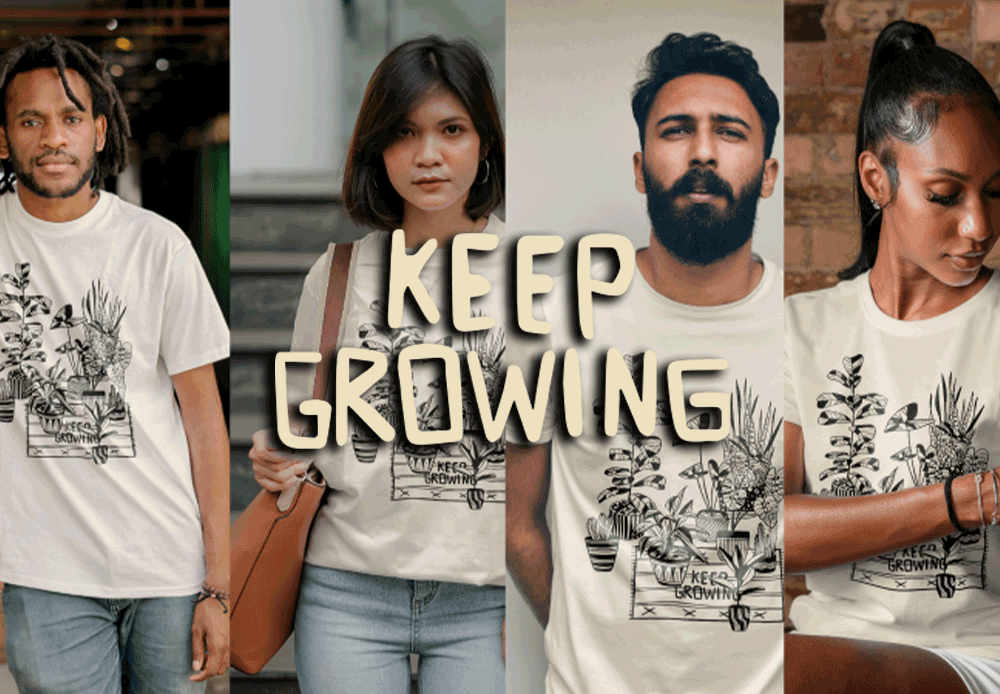Our production partners and local apparel manufacturers at Redwood Classics, have invested in a new technology – Sustainable All-Over-Print. They are the first end-to-end Canadian apparel producer to invest in this printing solution! Sustainability and quality have been at the core of Redwood Classics philosophy since its inception, and this technology puts them at the forefront of apparel manufacturing and printing in our industry.
Let us tell you more about the S.A.O.P technology that we have access to and how it challenges the traditional plastic-based ink we are used to.
S.A.O.P
Compared to other digital technologies, S.A.O.P removes the need for pre-press and post-press treatments. While the traditional printing process requires 12 wasteful steps, this method is only 3; load, print, and cure. This saves on energy, water, and labour. Plus, the technology enables printing on cotton materials compared to the polyester-based materials – which shed plastic microfibers into our waterways with every wash. The digital print process is an all-in-one production solution that also helps in these areas, contributing to Redwood Classics’ sustainability goals:
-
100% biodegradable ink
-
No screen, films, or pre-treatment prior to print
-
Prints on 100% cotton fabrics/substrates
-
Reduces microplastics
Here are some of the environmental standards certifications that the Sustainable All-Over-Print technology meets.
PROP 65
Proposition 65 requires businesses to notify Californians about significant amounts of certain chemicals in the products they purchase, enabling them to make informed decisions about exposure to a wide range of naturally occurring and synthetic chemicals known to cause cancer, birth defects, or other harm. This law has increased public awareness about the adverse effects of exposure to listed chemicals and has provided an incentive for manufacturers to remove listed chemicals from their products.
While Prop 65 does not directly affect Canadian goods, all products shipped to California must either be compliant or identified as non-compliant, thus Prop 65 has created a ripple effect throughout our industry, increasing consumer awareness across North America. You can read more about Prop 65 here.
OEKO-TEX
OEKO TEX standard is a textile certification system, used to research and certify fabrics, clothing, and household textiles. They offer different certifications which you can see here. The most common is the Standard 100 certification, which is most widely used and recognized. When a product is Standard 100 certified, it means that every aspect of the garment has been checked, from buttons to zippers and even the thread.
When you see an OEKO-TEX label, it informs you that it has been assessed for harmful substances in textiles and fabrics.
GOTS CERTIFIED
The Global Organic Textile Standard (GOTS) is the world’s leading processing standard for textiles made from organic fibres. The aim is to define the requirements to make sure the status of textiles, from the harvesting raw materials to manufacturing practices allow for credible assurance to end consumers. The certification can be applied to a product, company or both.
In order to obtain the GOTS label, textile products must contain a minimum of 70% organic fibres. Products must not be treated with toxic substances or coloured with non toxic dyes. The GOTS certification means that products are held to the highest standards. You can find out more about it here.
know that. The S.A.O.P allows for smaller orders, more efficient and affordable to produce fabric prints on a budget. This also provides access to consciously produced, Canadian-made garments, making sustainability more accessible.
If you’re interested in learning about how you can use Sustainable All-Over-Print for your next project, get in touch!



